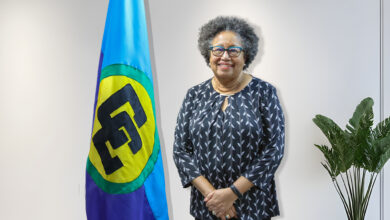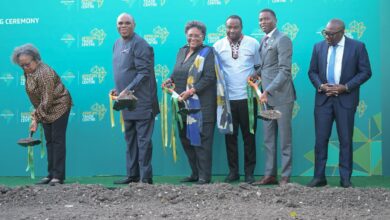- Honourable Ministers
- Distinguished ladies and gentlemen.
It gives me great pleasure to greet the distinguished gathering on the occasion of this Fifth International Conference of the Pan-African Enterprise Research Council. Congratulations to the Council on your continued commitment to quality research and advocacy regarding the participation of people of African descent in business and enterprise, elimination of discrimination and inequality, and realization of real economic benefits for the community.
I join today in your reflections on Pan-Africanism and the International Decade for People of African Descent (2015 – 2024), the latter representing an undertaking by the international community to seek to address the long history of exploitation and discrimination against people of African descent. Important historical antecedents to the current observance of the International Decade go as far back as the Pan-African conferences of the early 1900s and especially the 1945 Pan-African Congress in Manchester, England.
This Congress pressed for decolonization of Africa and first enunciated the vision of a liberated and united global Africa, closely linked with the diaspora. The landmark World Conference Against Racism held in Durban, South Africa in August/September 2001; the observance by the United Nations of the Bicentennial of the Abolition of the Trans-Atlantic Trade in captive Africans in 2007; and the Global African Diaspora Summit held in Johannesburg, South Africa in May 2012 should also be recalled as important historical markers.
We stand on the shoulders of many great Pan-Africanists whose vision and philosophy continue to guide our path to self-determination, such as Marcus Mosiah Garvey, National Hero of Jamaica, who articulated a vision for a new world, where all people of African origin are united, economically self-sufficient, and proud of their race. Important Pan-African thought leaders include CLR James, Kwame Nkrumah and Jomo Kenyatta, Aime Cesaire, George Padmore, Henry Sylvester- Williams and Dudley Thompson.
I must also recognise the tireless efforts of former Prime Minister of Jamaica, Mr. P. J. Patterson through the Institute for Africa-Caribbean Advocacy at The University of the West Indies, Mona, and Dr. Ralph Henry, Chairman of the Pan African Enterprise Research Council.
There is still much work to be done. More than half a century after formal independence, it is evident that Africa and its diaspora, including of course in the Caribbean, have yet to enjoy full political, economic, social, cultural and environmental freedom and sovereignty.
In 2013, two years ahead of the start of the International Decade for People of African Descent, at a meeting in Trinidad and Tobago, Heads of Government of the Caribbean Community unanimously resolved to pursue reparations for Native Genocide and Slavery from Europe on behalf of the people of the region. This led to the establishment of the CARICOM Reparations Commission, constituted by the membership of Chairpersons from national committees in 12 Member States, which has recently been expanded to include several civil society organisations.
This CARICOM initiative is building on long standing civil society activism by Pan-Africanists who have called for reparations for the crippling legacy of genocide against the first peoples of the region and centuries of enslavement and colonialism, with the attendant de-humanizing ideology of racism that continues to affect African people. This protracted period of exploitation is at the core of the contemporary reality of marginalization and persistent poverty which is highest among people of indigenous and African descent.
Systemic inequality and racism have more recently been starkly manifested in the devastating socioeconomic impact of the COVID-19 pandemic, which has compounded long standing inequities in access to decent employment, education, health care, housing, other social services and importantly – to justice.
Led by Professor Sir Hilary Beckles, Vice Chancellor of the University of the West Indies, the Commission has been spearheading a robust programme of advocacy, research and public education and has given intellectual leadership to a growing international movement for reparatory justice.
Heads of Government and the CARICOM Reparations Commission continue to advance the reparatory justice agenda. They have been encouraged by recent apologies and acknowledgement of the benefits gained from slavery by several prestigious academic institutions on both sides of the Atlantic, major corporations and wealthy families in Britain.
What is also encouraging is that within the Caribbean Community, we are increasing our cooperation with the African Union to build on the Pan-African vision and give meaning to the concept of the diaspora as the sixth region of Africa. At the Inaugural CARICOM-Africa Summit, which was hosted by former President of Kenya, His Excellency Uhuru Kenyatta, on 7 September 2021, Heads of Government committed to strengthen their cooperation in areas such as trade and investment promotion, development finance, climate change, mass media and forging increased people-to-people contact.
I am pleased with the progress being made in trade and investment promotion by way of strong support from Afreximbank. A formal partnership has been established, and the Caribbean headquarters is scheduled to be opened in Barbados next month. Member States will now have the opportunity to access financing for trade.
Less than a week ago, on Friday 21 July, we were pleased to participate in the Global Africa People to People Forum 2023 where civil society stakeholders from all five regions of the continent met in Barbados, a part of the sixth region, to spotlight positive and concrete Pan-African endeavours and projects, and address specific obstacles or predicaments that necessitate direct participation from African and/or Diaspora governments and civil society organizations.
I am confident that with similar ongoing dialogue and collaboration, and our collective wisdom, commitment, research and strategic interventions, we will move decisively closer to realising the goals of a united and thriving global Africa and do justice to the vision of the founding fathers of Pan-Africanism.
I wish you all a very successful conference and look forward to receiving recommendations and reports of outcomes as may be shared.
Thank you.






